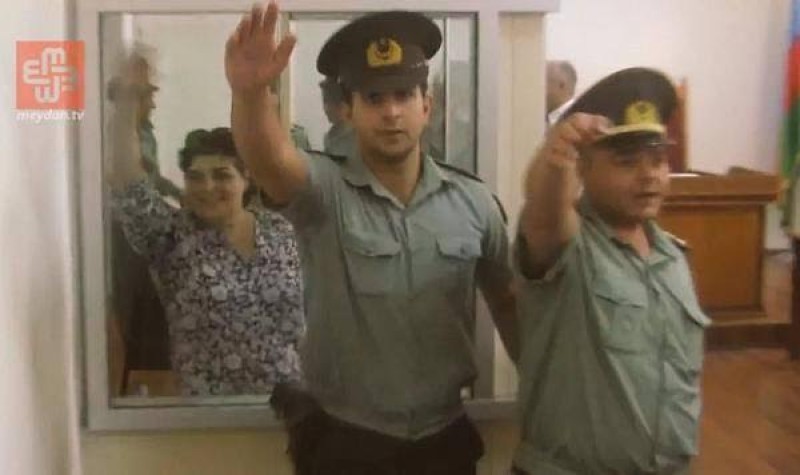Ismayilova, a senior reporter for OCCRP and Azadliq Radio (the Azerbaijani branch of Radio Free Europe/Radio Liberty), was found guilty in Baku’s Court of Grave Crimes of charges of embezzlement, tax evasion, abuse of power and running an illegal business – charges human rights groups say are politically motivated.
She was acquitted of the charge of inciting former colleague Tural Mustafayev to attempt suicide. Earlier in the trial, Mustafayev recanted his accusations against Ismayilova, which he said were made under pressure.
According to Khadija’s mother, Almira Ismayilova, Ismayilova laughed as the verdict was announced.
“She didn't say anything. She only laughed. Just like she always does. And she told me to say hi to everyone and tell everyone they should stay strong and step up the fight. And that they should not be afraid of anything. No one should be afraid of the court. It's not that frightening,” her mother said.
Baku police today ordered a privately-owned café near the court building to close in an apparent effort to prevent protesters gathering, reports RFE/RL.
About a hundred of Ismayilova’s supporters had met at the café yesterday in anticipation of a verdict, which was originally expected that afternoon.
However, the court postponed the verdict after Ismayilova launched a scathing take-down of corruption in the Azerbaijani government during her final statement.
After several complaints from the prosecutor and warnings from the judge, Ismayilova continued to deliver a speech in which she called her trial a “scam” and said she believed the “repression machine” of the authorities would soon collapse.
She also vowed to make opportunities from her imprisonment.
“I will build homes from the stones thrown at me,” she said.
Ismayilova’s trial began July 24 and has been fraught with tension and controversy.
Independent journalists attempting to cover the hearings have been pelted with stones, attacked by people emerging from the courtroom, detained by police and repeatedly refused access to hearings.
Supporters and international observers have also been refused entry to the courtroom, although Ismayilova’s mother and a handful of diplomats have been able to attend some hearings.
A motion by Ismayilova’s lawyers to extend the evidentiary phase of the trial was refused by the judge, and the prosecutor accused Ismayilova of deliberately seeking to delay the trial.
For her part, Ismayilova has referred to the proceedings as “an express court,” complaining she had little time to confer with her lawyers over matters in her defense.
Before her arrest on Dec. 5, 2014, Ismayilova reported extensively on corruption in the upper echelons of the Azerbaijani government, including apparent nepotism among the friends and family of President Ilham Aliyev.
After she was taken into detention, the office of Azadliq Radio was raided by police. Twelve journalists who closely worked with Ismayilova were taken in for questioning, then released without charge.
Ismayilova believes her investigative work is the real reason behind her legal problems, claiming at a hearing on Jul. 24 that Aliyev “imprisoned me to hinder my journalistic activity.”
Her first major story that touched on corruption within the Azerbaijani First Family, written for RFE/RL, revealed that the privatization of parts of the state airline AZAL – including a bank – had bypassed an official committee for privatization.
The bank’s two new owners included the president’s daughter Arzu Aliyeva.
Ismayilova went on to reveal how the Azerbaijani government awarded the rights to a gold mine to President Aliyev’s family, as well as how the First Family had profited from the construction of a US$ 134 million concert hall to host the Eurovision Song Contest in 2012.
Long before her arrest, Ismayilova suffered repeated harassment that she believes was linked to her work.
Unknown agents hid a video camera in her bedroom and recorded her in intimate contact with her boyfriend, threatening her with exposure. The videos were released in the spring of 2012.
She was also hit with a travel ban in October 2014 as she attempted to attend a human rights conference in Prague.
Meanwhile officials have publicly denounced Ismayilova.
Ramiz Mehdiyev, President Aliyev’schief of staff, issued a scathing 60-page report in December accusing Ismayilova of “defiance” and showing a “destructive attitude toward well-known members of the Azerbaijani community”.
The statement also accused Azadliq Radio, RFE/RL’s Azerbaijani service, of working “for a foreign secret service.”
One of Ismayilova’s most recent projects, published in summer 2014, was a story linking President Aliyev’s daughters to ownership of Azerbaijan’s largest mobile operator, Azercell Telecom.
Since her detention began, OCCRP has continued Ismayilova’s work exposing corruption in President Aliyev’s regime through an investigative journalism series called The Khadija Project.
OCCRP revealed in May this year that a company close to Aliyev and his family had likely walked off with more than US$ 1 billion in a takeover of the Azerbaijani state’s stake in Azercell.
This month, OCCRP journalists created an interactive tool to document the billions stolen in Azerbaijan. And today OCCRP published a new report detailing the First Family’s free use of super-luxury yachts owned by the State Oil Company of Azerbaijan (SOCAR).
Azerbaijan has a poor record for free speech. According to human rights organizations, there are at least 80 political prisoners in Azerbaijan.






